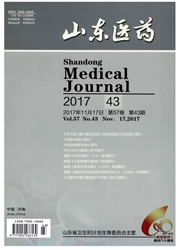

 中文摘要:
中文摘要:
目的研究链脲佐菌素(STZ)脑室内注射对小鼠学习记忆功能的影响及其机制。方法将12只小鼠随机分为STZ组和对照组,分别向侧脑室注射STZ 3mg/kg和等量生理盐水。采用Morris水迷宫进行行为学检测,Westernblot技术分析小鼠脑内细胞骨架蛋白神经丝蛋白磷酸化的表达,采用生化和ELISA方法测定小鼠脑组织内丙二醛(MDA)、超氧化物歧化酶(SOD)、谷胱甘肽(GSH)、乙酰胆碱(Ach)和乙酰胆碱酯酶(AchE)含量的变化。结果①Morris水迷宫:定位航行试验中,STZ组平均逃避潜伏期和路径长8度较对照组明显增加;空间探索试验中,STZ组穿越隐匿平台次数较对照组明显减少(P均〈0.05)。②Western-blot:与对照组相比,STZ组细胞骨架神经丝的磷酸化表达显著增强(P〈0.05)。③氧自由基:与对照组相比,STZ组MDA明显升高(P〈0.01),SOD和GSH无明显变化。④胆碱能系统:STZ组脑内Ach含量明显低于对照组,Ache含量高于对照组(P均〈0.05)。结论STZ脑室内注射能引起小鼠阿尔茨海默病(AD)样学习记’忆功能的减退和AD样早期细胞骨架病理改变,可能与脑组织氧自由基增多、中枢胆碱能系统活性抑制相关。
 英文摘要:
英文摘要:
Objective To explore the effect of streptozotocin (STZ) intracerebroventricular injection on learning and memory abilities of mouse and its mechanism. Methods Twelve mice randomly were divided into 2 groups of intracere-broventricular injection:the experimental group (STZ, 3 mg/kg), the control group (CON, equal volume of 0.9% saline). Morris water maze was used to detect the learning and memory abilities of mice. The phosphorylation of neurofilament in mice brain induced by STZ injection was detected by Western blot. Biochemistry method and ELISA were used to detect the content of malonaldehyde (MDA), superoxide dismutase (SOD), glutathione (GSH), acetylcholine (Ach) and acetylcholinesterase (AchE). Results ①Morris water maze : The swimming time and distance to find the platform in the located navigation test increased in the mice treated with streptozotocin compared to the control;the number through the hid- den platform in spatial probe test reduced in the STZ-treated mice compared to the control group (P 〈 0.05). ②Analysis of Western blot :The enhanced expressions of phosphorylation of neurofilament detected by SMI31 antibody were obvious in the mice brain treated with STZ compared to the control brain, displayed statistic difference. ③Oxygen radical detection: The MDA content of STZ -treated mice brain was obviously higher than that of the control group, while the content of SOD and GSH displayed no obvious difference between the STZ -treated mice and control mice. ④Cholinergic system:The level of Ach in STZ treated brain was lower than that in control brain. The increased activity of AchE was obviously in the mice brain treated with STZ compared to the control brain ( P 〈 0.05 ). Conclusions Treptozntocin intracerebroventricular injection can cause the impairment of Alzheimer's disease-like learning and memory in mice and AD-like early cytoskeleton associated pathology, which might have relation with the increased oxygen radical products, reduc
 同期刊论文项目
同期刊论文项目
 同项目期刊论文
同项目期刊论文
 期刊信息
期刊信息
